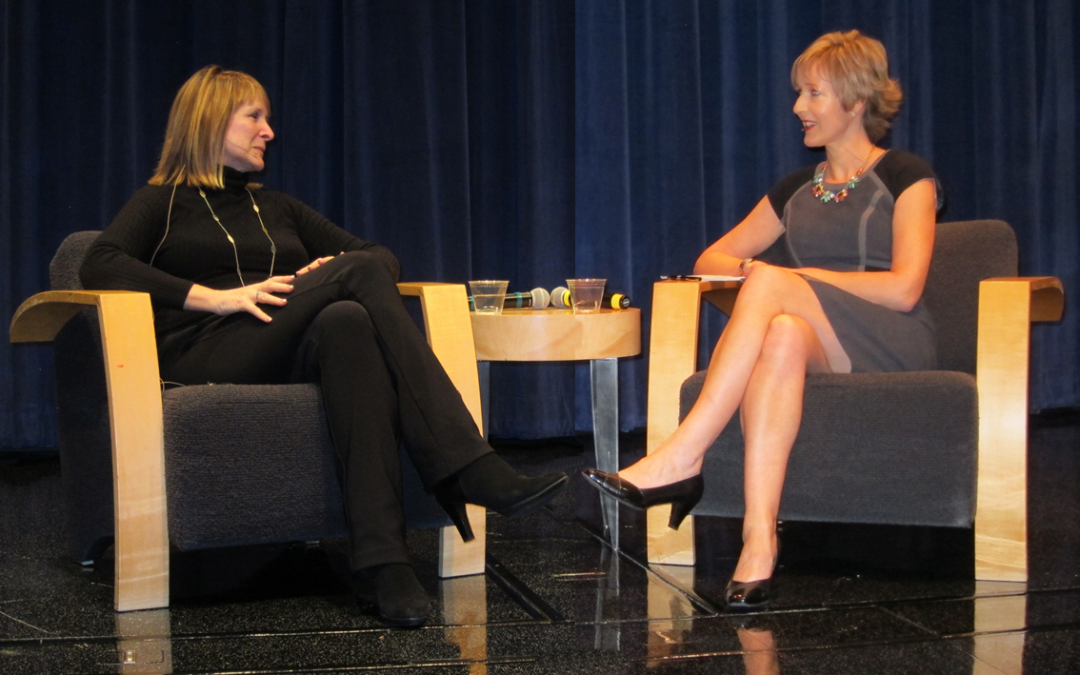
Mar 23, 2015 | Education, Inspiring Women, Silicon Valley Events, Women in tech
By Alison van Diggelen, host of Fresh Dialogues
Heidi Roizen has been on both sides of the entrepreneur funding divide, so her advice for aspiring entrepreneurs is particularly potent. She’s an operating partner at venture capitalists DFJ, a lecturer in entrepreneurship at Stanford University and a successful Silicon Valley entrepreneur. Last month, I interviewed Roizen at the Commonwealth Club, Silicon Valley. That interview led to many more questions about what it takes to succeed, especially the need to build meaningful relationships. Here’s our deeper exploration:
van Diggelen: You teach entrepreneurship at Stanford University: What are the top 5 lessons for being a successful entrepreneur?
Roizen: When we study and meet with successful entrepreneurs, while each has a different path to success, they all exhibit similar mindsets. For one, they seem to go through life looking at problems as things for which there can be a solution — i.e. they do not accept the status quo, no matter how ingrained. Second, they are not afraid to iterate (or ‘fail’, i.e. learn from a mistake, course correct, and move on.) They tend to be tenacious, that is, they view the failures along the way as necessary steps in getting to success — not as indicators that they should stop. They tend to be very good at telling their stories, building a narrative about the problem, the solution, and what it takes to get there. Finally, successful entrepreneurs tend to know the importance of finding and motivating awesome people to join them in their journey.
van Diggelen: Talk about the importance of networks and the do’s and don’ts of finding and being a good mentor.
 Roizen: Let me answer this by starting at the 100,000 foot level. I’ve done a lot of reading about human happiness and I boil the answer down to having meaningful work and meaningful relationships. I believe that if you can do meaningful work with others you build even more meaningful relationships. I hate the word “network” as it almost has a negative connotation — none of us want to be cornered by a ‘networker’ at an industry cocktail party! But, instead I think of ‘building a network’ as a lifelong process of forming relationships with people, finding ‘fellow travelers’ who may share a passion for the same problem that needs to be solved, a skillset that is complementary but appreciated, someone with good common sense to bounce ideas off of — whatever brings value and meaning to each of us in a human connection. For me, those people and those relationships — new and old — help me to keep learning and keep finding new opportunities for work, for growth, for meaning.
Roizen: Let me answer this by starting at the 100,000 foot level. I’ve done a lot of reading about human happiness and I boil the answer down to having meaningful work and meaningful relationships. I believe that if you can do meaningful work with others you build even more meaningful relationships. I hate the word “network” as it almost has a negative connotation — none of us want to be cornered by a ‘networker’ at an industry cocktail party! But, instead I think of ‘building a network’ as a lifelong process of forming relationships with people, finding ‘fellow travelers’ who may share a passion for the same problem that needs to be solved, a skillset that is complementary but appreciated, someone with good common sense to bounce ideas off of — whatever brings value and meaning to each of us in a human connection. For me, those people and those relationships — new and old — help me to keep learning and keep finding new opportunities for work, for growth, for meaning.
As for finding and being a mentor, my main piece of advice, for either the mentor or the mentee, is the relationship only works if there are shared values/ethics, and if there is something meaningful to work on together. That is why I personally believe asking someone to simply ‘be my mentor’ is far less productive than finding for example someone to work for who you can also see as becoming your mentor.
van Diggelen: What do you mean by “living a relationship driven life” versus “a transaction driven life”? Can you give some examples?
Roizen: I’m a big believer in leading a relationship-driven life and I’ve blogged about it here. In short, if you believe what I said above about meaningful relationships being the key to happiness (a big ask I know!) then it makes sense that every transaction in which there are one or more others involved becomes an opportunity to build a relationship. From my life experience, I run into the same people working in this industry over and over and over, so the quality of every transaction is important because it builds a relationship that transcends any individual transaction.
In business school, we learned that a negotiation should be viewed as ‘an opportunity to find the maximal intersection of mutual need.’ I love this concept, instead of a transaction being ‘zero sum’, we can actually achieve a better result for both of us by putting our two heads together to solve both our problems.
van Diggelen: What’s been your hardest challenge as an entrepreneur and how did you overcome it?
Roizen: Almost running out of money many times. Microsoft entering our market. Shipping a product with a lot of bugs. Emotional disagreements with cofounders and key contributors. In other words, there really is no hardest challenge in entrepreneurship, rather there are a whole series of ‘near-death’ experiences. They key is to not let them become ‘death’ experiences! There’s no overcoming, just pushing through, getting back up, learning from your mistakes, mending fences, and moving on. And if you fail in the big picture and your company ends up going out of business, do it with empathy and honor and in Silicon Valley, you will usually get another at-bat.
van Diggelen: How do you see Silicon Valley changing in the next 5-10 years?
Roizen: I think what makes Silicon Valley so special will continue to fuel our next 5-10 and many more years. I do think the valley is changing in a few ways. For one, we are spreading our attention from ‘the next cool iPhone app’ to solving some of the world’s bigger problems, which I find very exciting and frankly more fulfilling. We are seeing technology have a far greater impact on those diverse big problems — from health to food to energy. I am really excited to see what the next 20 years brings about!
Explore more Inspiring Women at Fresh Dialogues
Kiva cofounder, Jessica Jackley: 3 Startup Tips for Entrepreneurs
Diane von Furstenberg: Why Fear is Not an Option
Cisco’s CTO Padmasree Warrior: 7 Secrets of Success
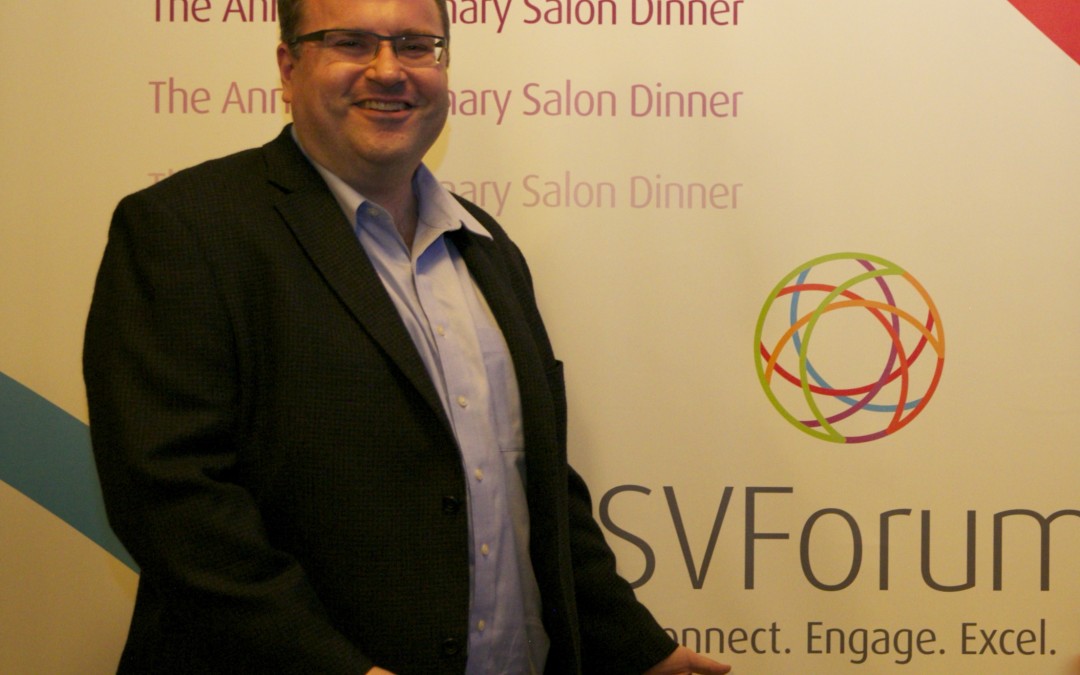
Mar 4, 2015 | Entrepreneurship, Entrepreneurship & Innovation, Silicon Valley Events
By Alison van Diggelen, host of Fresh Dialogues
LinkedIn Cofounder and tech investor extraordinaire, Reid Hoffman delivered some compelling entrepreneurial insights to an intimate group in Silicon Valley last week. It earned him a few more stars for his “visionary” reputation; however his insights on the drive to get more women in tech fell far short of expectations. See below…
The gathering was an elegant SVForum affair, led by CEO Adiba Barney.
Here’s some of Hoffman’s valuable wisdom for entrepreneurs:
1. Don’t keep your big idea a secret
According to Hoffman, if you don’t share your startup idea with people who can help you, it’s “a massive recipe for failure.”
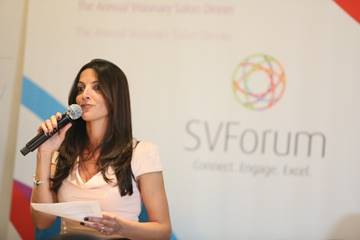 2. Mine your network
2. Mine your network
As Hoffman emphasizes in his latest book The Alliance, “An externally networked workforce is critical to an innovative company.” What he means by this is:
a. nurture your wider network (give and take advice) and be active on social media
b. encourage your employees to do likewise
c. seek wisdom from the smartest people you know outside your company
Hoffman illustrated this with an anecdote about his “odd couple” alliance with PayPal cofounder Peter Thiel, whom he initially considered “to the right of Attila the Hun” and who considered Hoffman a communist.
3. Don’t rush the IPO
Hoffman underlined that IPOs aren’t the holy grail they once were, thanks to late stage investors with large cash infusions. IPOs must make sense strategically for your startup.
“The key question for any company is how an IPO can help you build your company into something that may be around for decades or hundreds of years and help to transform the industry they are in,” says Hoffman.
This fits with what Elon Musk told me when I asked him about a SpaceX IPO. He pointed out that there are major disadvantages to going public, especially if your business has very long term goals (like going to Mars!)
 And now on to the subject of the dismally low number of women in Silicon Valley’s tech companies. Latest figures show only 25% of LinkedIn’s leadership is female, the number is even lower for women holding tech positions (17%).
And now on to the subject of the dismally low number of women in Silicon Valley’s tech companies. Latest figures show only 25% of LinkedIn’s leadership is female, the number is even lower for women holding tech positions (17%).
Since Hoffman prides himself as a public intellectual, I asked him what LinkedIn is doing to increase the number of women in tech; and what the academic case is for doing so. Frankly, I thought he’d cite one of the many studies which show the positive correlation between the number of women executives and company success.
Here’s his response:
“Women on average are much more diligent than men and much more capable of learning a set of different things, so having them deeply engaged in technology, creating the future is important. And then there’s obviously the full ramp of sensibilities for how products should work…how those human ecosystems should work. So I think it behooves…the world is much better off… with having an industry that isn’t – as it’s historically been – very balanced on the male side, but to be trending toward a more evenly balanced industry. There are various initiatives – the Lean In one is just the most recent.” Reid Hoffman
That’s it.
He’s referring to the announcement on February 8th that LeanIn.org, Facebook, LinkedIn and the Anita Borg Institute have created a partnership to expand Lean In Circles on college campuses. Reid Hoffman and the LinkedIn team deserve some praise for their involvement, but that’s it? I didn’t get the feeling that this topic is high on Hoffman’s agenda, or that he cares that much about it.
Here’s my vision: I’d like to see Mr Hoffman use his profound intellect and growing visionary platform to inspire more action and help get more women into the tech field.

Oct 15, 2014 | BBC World Service, Entrepreneurship, Silicon Valley Events
This summer, I was invited to share Letters from Silicon Valley with the BBC. This is the first of my letters and aired on BBC Business Daily on Friday September 26th, 2014. It was bookended by an interview with Silicon Valley’s Peter Thiel and the haunting opus, Do Not Go Gentle Into That Good Night, read by Dylan Thomas.
Listen to the podcast (Letter from Silicon Valley starts at 11:12)
The BBC’s Manuela Saragosa hosted the show. Here’s her introduction:
Saragosa: Seeing the world from a Silicon Valley perspective where failing is essential to success…
van Diggelen: You might be thinking that encouraging employees to fail is the nuttiest thing you’ve ever heard. But here’s the thing: if you don’t create a risk taking culture, then how are you going to invent the future?
Saragosa: … that’s Silicon Valley for you. As Peter Thiel says, it’s a counter cultural kind of place and California’s ultra competitive technology industry has its own way of going about things. Take success: to get there, failure is positively encouraged. Journalist, Alison van Diggelen has this report from San Francisco.
van Diggelen: The popular cartoon character, Homer Simpson famously said, “Trying is the first step to failure.”
I imagine Homer wouldn’t survive long in the tech world of Silicon Valley, where trying and failing is vital to the region’s dominance as the global center of innovation.
In Silicon Valley, it’s a badge of honor to fail, as long as you fail fast and learn from the experience. Here in Silicon Valley, mistakes don’t define you. They refine you.
Fear of failure doesn’t hold people back.
That’s why Google is constantly putting out products “in beta.” They try them out, and if they take off, like Gmail, support goes full throttle.
We all know Gmail, but do you remember Google Desktop, Google PowerMeter and Google Health? Probably not. They were launched and then quietly discontinued. Failures, yes, but you can be sure they delivered valuable lessons for Google products. Google Glass may go the same way, but it won’t damn the company as a failure. Not in Silicon Valley, anyway.
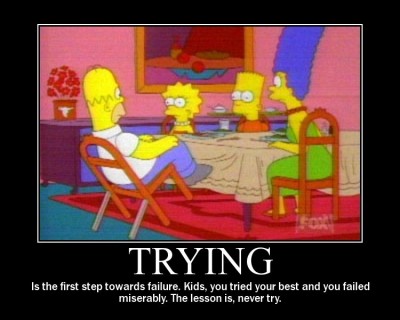 You see, failure is viewed differently here. That’s why innovation blooms in SV.
You see, failure is viewed differently here. That’s why innovation blooms in SV.
And that’s why Silicon Valley gets the lions share of venture capital investment.
Some of the most innovative leaders in SV have the mantra, “if you’re not failing half the time, you’re not trying hard enough.”
They create a climate of cooperation, allowing teams to make and learn from mistakes, and change “business as usual.”
For skeptics, you might think encouraging employees to fail is the nuttiest thing you’ve ever heard, but here’s the thing: If you don’t create a risk-taking culture that condones, even celebrates failure, then how are you going to invent the future?
Incremental steps just won’t cut it. True innovation needs giant leaps.
If Steve Jobs and Steve Wozniak had accepted the DOS command-line-interface and didn’t ‘think different,’ we might still be stuck in the dark ages of black computer screens…
But how to overcome your fear of failure?
I recently interviewed Professor John Krumboltz at the Commonwealth Club of California. He’s the author of Fail Fast, Fail Often and is renowned for his fail fast, fail often mantra. He’s spent a lifetime at Silicon Valley’s Stanford University, exploring why successful people spend less time planning and more time acting.
“Making mistakes is important to human development,” he stresses. “Just do it!”
He cites the example of SV’s Pixar Studios, which makes computer-animated films like Wall-e and Finding Nemo. Pixar’s President, Ed Catmull says a few good ideas are often buried amid many “half-baked and outright stinkers.” By giving themselves permission to fail again and again, the team weeds out bad ideas quickly and gets to the place where real work can occur. Catmull describes the process as going from “suck” to “non-suck.”
In the business world, fear of failure can prevent you sticking your neck out, being innovative, trying something new. Perhaps you’re paralyzed by the Homer Simpson’s defeatist: “if I don’t try, then I won’t fail.”
Instead, remember that no one sets out to fail: failure isn’t your friend, but fear of failure is definitely your enemy.
Alison van Diggelen, of Fresh Dialogues, for the BBC World Service in Silicon Valley
Find out more about my appearances on BBC World Service
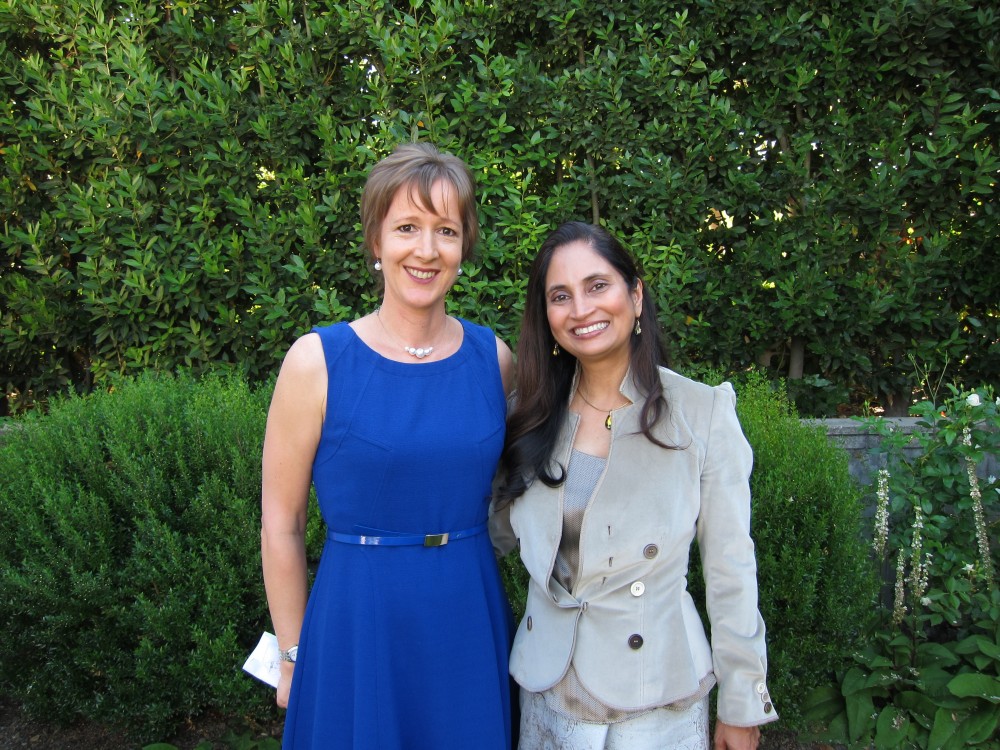
Aug 16, 2013 | Inspiring Women, Just for mothers, Silicon Valley Events
Alison van Diggelen, host of Fresh Dialogues
Cisco System’s CTO Padmasree Warrior discusses the “Lean In” Movement, and what lessons she’s learned in her remarkable career. Warrior, an influential Silicon Valley tech leader, on the Forbes List of 100 Most Powerful Women, says women shouldn’t hold themselves back, they should be “out there and leaning in to opportunities.”
.
.
Warrior emphasizes the importance of authenticity in leadership, letting people see “who you truly are.” Of course, being approachable…coaching, mentoring, and brainstorming ideas with your team are also key, she says.
On the question of finding balance in your life, Warrior is blunt. “I don’t like the word ‘balance,’” she says. “To me that somehow conjures up conflict between work and family…as long as we think of these things as conflicting, we will never have happiness. True happiness comes from integration…of work, family, self, community.”
Warrior dedicates Saturday as her digital detox day where she puts down her smartphone and busies herself with family and gardening, painting, cooking, even haiku. Check out her eclectic Twitter feed to learn more.
She told me that letting go of guilt is a vital lesson. “When my son was growing up, I was always guilty, no matter what I did, ” she says. “Make decisions and be happy with the decisions you’ve made. I tell myself in the long run, it’s the love, the quality of relationships that you have with your family, your friends and giving back to the community that matters.”
Here’s a summary of Warrior’s Seven Secrets of Success. Watch the video for all the details.
1. Be authentic, approachable
2. Mentor and coach others
3. Be out there and “lean in” to opportunities
4. Forget “balance” – integrate work, family, self, community
5. Avoid guilt
6. Be happy with your decisions
7. Think long-term and focus on relationship quality
The interview was recorded at SVForum’s Visionary Awards in Silicon Valley, June 26, 2013. Warrior was one of four honorees. Find out more about Warrior and her advice for getting more women in STEM.
Alison van Diggelen asks Fresh Questions and gets Fresh Answers. Find out more about her green interview series. And join the conversation on Facebook.
This is part of a special “Inspiring Women” series at Fresh Dialogues featuring Meryl Streep, Sheryl Sandberg, Jennifer Granholm, Maureen Dowd, and Belva Davis.

May 9, 2013 | Just for mothers, Silicon Valley Events
By Alison van Diggelen, host of Fresh Dialogues
If you think you’ve read everything about Sheryl Sandberg and her book “Lean In” think again. Last night, Sandberg joined her ex-boss, Google’s Eric Schmidt in conversation at Silicon Valley’s Computer History Museum. As the guy who recruited Sandberg to Google back in 2001, Schmidt used his intimate knowledge to give us something new: an insider’s view of this remarkable woman. He describes her as “One of the great leaders of our industry who has built two multimillion dollar businesses already and has a lot ahead of her.”
Sitting with “Lean In” on his lap, Schmidt casually thumbed through her book, quoting excerpts, asking astute questions and making pithy remarks about topics such as gender bias, finding “the perfect” partner and even shared some of his business philosophy. To close, he asked her to read a short passage and the audience appeared to hold its collective breath. Check out the video.
Here are some highlights:
On leaning in while Parenting
“Wake up Silicon Valley. Put more girls into computer camp!” Sheryl Sandberg
Sandberg was appalled to discover that only 5 of the 35 kids enrolled in a Stanford computer science camp last year were girls.
On Gender Bias
“I’ve written the book on it and it’s still happening to me!” Sheryl Sandberg
On Pay Negotiations
“Women still pay a penalty for negotiating for themselves.” Sheryl Sandberg
She was delighted to hear from women who’re now saying to their bosses: “Sheryl Sandberg wants me to ask you for a raise.”
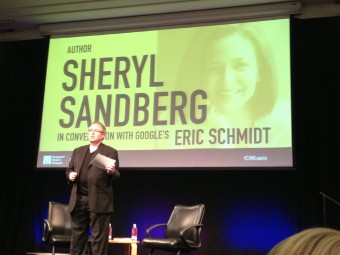
John Hollar makes humorous introductions at the Sandberg/Schmidt event. Photo: Fresh Dialogues
Best Advice from Eric Schmidt
“Don’t be an idiot. Google is a rocket ship and when you’re offered a seat on a rocket ship, don’t ask what seat.” Sheryl Sandberg
On Choosing a Partner
“Marry someone who wants equality…(including) night feedings, and changing 50% of diapers.” Sheryl Sandberg
On Motherhood
“Work efficiency grows when you become a mother.” Sheryl Sandberg
On Stay At Home Mothers (SAHMs) and the Mommy wars
“I can feel guilty or grateful….(choose) to be more generous with each other. ” Sheryl Sandberg
On Re-entering the workforce (after time off being a SAHM)
“Ask where are my skills needed. Experience is less relevant. Be flexible, adapt.” Sheryl Sandberg
On Mandating Quotas for Company Boards
“I’m not arguing for it…it hasn’t moved other numbers in places like Norway (like the number of female VPs, other leadership roles).” Sheryl Sandberg
On Stupidest Criticism of her book
“I’m blaming women…I’m not!” Sheryl Sandberg
On Best Criticism
“I’m embracing stereotypes…I don’t want to, but that is what’s required till we get many more women leaders.” Sheryl Sandberg
On what happens next
“We’ve set up a community at LeanIn.org and people are starting circles, even fathers and daughters are starting circles. We’re unleashing a movement.” Sheryl Sandberg
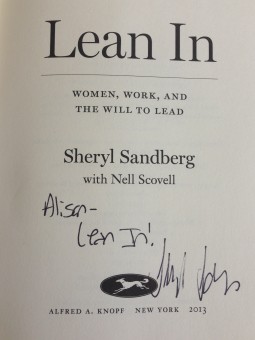
Sheryl Sandberg urges all women to Lean In. Photo: Fresh Dialogues
On political aspirations
“I’m rooting for Hillary in 2016. I’m happy at Facebook and helping women get into office.” Sheryl Sandberg
Eric Schmidt also had some memorable remarks
On Finding the Right Partner
“Dave (Sandberg’s husband Dave Goldberg) is indeed perfect.” Eric Schmidt
On the work-life juggle, guilt trips
“Redefine your situation as success.” Eric Schmidt
On Feminism
“Feminism 2.0 means understanding stereotypes and becoming empowered.” Eric Schmidt
On Succeeding in Business
“Revenue solves all known problems. Concentrate on cashflow.” Eric Schmidt

Jan 15, 2013 | Electric Vehicles, Silicon Valley Events
By Alison van Diggelen, host of Fresh Dialogues
Electric vehicles made a big impact last week at the 2013 Silicon Valley International Auto Show. Steve Smith, President of the Silicon Valley Auto Dealers Association gave Fresh Dialogues a tour of the electric offerings Sunday from Fiat, General Motors and Ford; and explained that the affluent, well educated Silicon Valley market is particularly open to EVs. This year shows a surge in the number of electric and hybrid vehicles from major players. It’s significant that even Cadillac has announced a hybrid coupe, featuring both lithium-ion battery and a four cylinder gas engine.
Smith confirmed that even consumers not ready to go all-electric are focused on fuel economy statistics this year. The cute new Fiat 500e got an EPA 116 miles per gallon equivalent combined fuel economy rating (122 MPGe city and 108 MPGe highway) and the company estimates fuel costs of $500/year. That would keep your average Hummer driver on the road for, umm, maybe a month?
The new Chevy Spark looked cute and compact in powder blue, but spokesperson Anne-Marie Damman confirmed that for now, the 80-mile range EV will only be available in California and Oregon. The reason? They’re the only states with sufficient charging infrastructure in place. Although California’s EV infrastructure leads the way, it’s also suffering growing pains.
Tesla’s all electric Model S was missing from the line up in Silicon Valley, but its Model X made a big splash at this week’s Detroit Auto Show. Check out some of the Silicon Valley Auto Show highlights in the slideshow below.
The all electric Chevy Spark
Picture 1 of 17
Anne-Marie Damman: the Chevy Spark will have an 80 mile range and only be available in CA & OR, Alison van Diggelen of Fresh Dialogues
Check back later this month for the full interview with Steve Smith of SVADA on what makes the Silicon Valley Auto Show so unique and why he thinks car sales will spike this year.

 Roizen: Let me answer this by starting at the 100,000 foot level. I’ve done a lot of reading about human happiness and I boil the answer down to having meaningful work and meaningful relationships. I believe that if you can do meaningful work with others you build even more meaningful relationships. I hate the word “network” as it almost has a negative connotation — none of us want to be cornered by a ‘networker’ at an industry cocktail party! But, instead I think of ‘building a network’ as a lifelong process of forming relationships with people, finding ‘fellow travelers’ who may share a passion for the same problem that needs to be solved, a skillset that is complementary but appreciated, someone with good common sense to bounce ideas off of — whatever brings value and meaning to each of us in a human connection. For me, those people and those relationships — new and old — help me to keep learning and keep finding new opportunities for work, for growth, for meaning.
Roizen: Let me answer this by starting at the 100,000 foot level. I’ve done a lot of reading about human happiness and I boil the answer down to having meaningful work and meaningful relationships. I believe that if you can do meaningful work with others you build even more meaningful relationships. I hate the word “network” as it almost has a negative connotation — none of us want to be cornered by a ‘networker’ at an industry cocktail party! But, instead I think of ‘building a network’ as a lifelong process of forming relationships with people, finding ‘fellow travelers’ who may share a passion for the same problem that needs to be solved, a skillset that is complementary but appreciated, someone with good common sense to bounce ideas off of — whatever brings value and meaning to each of us in a human connection. For me, those people and those relationships — new and old — help me to keep learning and keep finding new opportunities for work, for growth, for meaning. 

 2. Mine your network
2. Mine your network And now on to the subject of the dismally
And now on to the subject of the dismally 
 You see, failure is viewed differently here. That’s why innovation blooms in SV.
You see, failure is viewed differently here. That’s why innovation blooms in SV.






